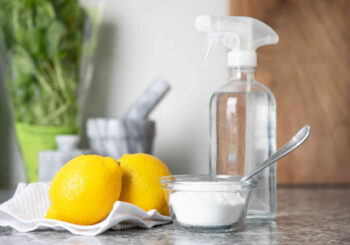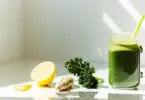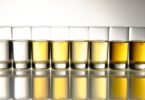Staff Writer for Wake Up World
In today’s world, many people are concerned about the impact of harmful chemicals on their health and the environment. With the rise of natural and eco-friendly products, it’s becoming easier to avoid the harsh chemicals found in many traditional cleaning products. However, these products can often come with a hefty price tag, and many people are looking for natural and affordable ways to keep their homes clean.
That’s where natural cleaning tips and tricks come in. By using simple ingredients that you likely already have at home, such as vinegar, baking soda, and lemon juice, you can effectively clean and disinfect your home without the need for harsh chemicals.
Not only are natural cleaning methods better for your health and the environment, but they can also be more cost-effective in the long run. Plus, they often leave your home smelling fresh and clean, without the overpowering chemical scent that many commercial cleaners have.
In this article, we’ve compiled a comprehensive list of the top 23 natural cleaning tips that you can try at home. From cleaning your oven with baking soda and vinegar to disinfecting your phone with rubbing alcohol, these tips cover a wide range of cleaning needs.
By incorporating these natural cleaning tips into your routine, you can keep your home clean and healthy while also doing your part to protect the planet. So why not give them a try and see the difference for yourself?
1. Vinegar and Baking Soda for Drain Cleaning
Clogged drains can be a frustrating and unsanitary problem. Rather than using toxic drain cleaners, try a mixture of vinegar and baking soda to break down the blockages. Pour a cup of baking soda down the drain, followed by a cup of vinegar. Let it fizz for a few minutes and then flush with boiling water.
2. Lemon for Cleaning Stainless Steel
Stainless steel surfaces and appliances can be challenging to clean without leaving streaks or damaging the finish. A simple solution is to cut a lemon in half and use it to clean the surface. The citric acid in the lemon can help remove stains and brighten the metal. Rinse the surface with water and buff with a soft cloth.
3. Salt for Cleaning Cast Iron Pans
Cast iron pans are great for cooking, but they require some special cleaning care. Avoid using soap and water as it can strip the seasoning from the pan. Instead, sprinkle some coarse salt on a damp sponge and scrub the pan with it. The salt helps remove any stuck-on food and also helps to season the pan.
4. Tea for Cleaning Mirrors and Windows
Tired of using expensive window cleaners that leave streaks and chemical residues? Brew some black tea, let it cool, and pour it into a spray bottle. Spray the tea on mirrors and windows and wipe with a clean cloth. The tannins in the tea help to remove dirt and grime, leaving your surfaces sparkling clean.
5. Toothpaste for Cleaning Silver
Silver jewelry and utensils can quickly tarnish, but there’s no need to use harsh chemicals to clean them. Apply a small amount of toothpaste to a damp cloth and rub it onto the silver. Rinse with water and buff with a clean cloth. The abrasive properties of toothpaste help to remove tarnish and restore shine.
6. Club Soda for Cleaning Carpets
Spills and stains are bound to happen, but you don’t need to use harsh chemicals to clean your carpets. Pour club soda onto the stained area and let it sit for a few minutes. Blot the area with a clean cloth to absorb the stain. The carbonation in the club soda helps to lift the stain.
7. Olive Oil for Cleaning Wood Furniture
Wood furniture can be tricky to clean without damaging it. However, you can use olive oil and lemon juice to clean and protect it. Mix equal parts olive oil and lemon juice and apply it to a soft cloth. Use the cloth to wipe down your wood furniture. The olive oil helps to moisturize and protect the wood, while the lemon juice helps to clean it.
8. Cornstarch for Cleaning Grease Stains
Grease stains can be stubborn, but cornstarch can help. Sprinkle cornstarch on the grease stain and let it sit for a few minutes. Brush off the cornstarch and then apply a mixture of equal parts vinegar and water to the stain. Let it sit for a few minutes and then rinse with water. The cornstarch helps to absorb the grease, while the vinegar and water mixture helps to remove the stain.
9. Hydrogen Peroxide for Cleaning Grout
Grout can quickly become dirty and discolored, but you don’t need harsh chemicals to clean it. Mix equal parts hydrogen peroxide and baking soda to make a paste. Apply the paste to the grout and let it sit for 10-15 minutes. Scrub the grout with a brush and then rinse with water. The hydrogen peroxide helps to whiten the grout and kill bacteria.
10. Beeswax for Polishing Wood
Beeswax is a natural and safe way to polish and protect your wood furniture. Melt some beeswax in a double boiler and mix in a few drops of essential oil. Let the mixture cool and apply it to your furniture with a soft cloth. The beeswax helps to moisturize and protect the wood while also giving it a beautiful shine.
11. Baking Soda for Cleaning Tile Grout
Tile grout can be a challenging area to clean, but baking soda can help. Mix equal parts baking soda and water to make a paste. Apply the paste to the grout and let it sit for a few minutes. Scrub the grout with a brush and then rinse with water. The baking soda helps to remove stains and discoloration from the grout.
12. White Vinegar for Cleaning Glass Shower Doors
Glass shower doors can quickly become covered in soap scum and hard water stains, but white vinegar can help. Mix equal parts white vinegar and water in a spray bottle and apply it to your shower doors. Let it sit for a few minutes and then wipe clean with a soft cloth. The acidity in the vinegar helps to break down the buildup on the glass.
13. Citrus Peels for Garbage Disposal Cleaning
Garbage disposals can become smelly and clogged, but citrus peels can help to freshen them up. Put some citrus peels in your garbage disposal and turn it on. The peels help to clean the blades and provide a fresh citrus scent.
14. Olive Oil for Stainless Steel Appliances
Stainless steel appliances can quickly become covered in fingerprints and smudges, but olive oil can help. Apply a small amount of olive oil to a soft cloth and use it to clean your stainless steel appliances. The oil helps to remove fingerprints and smudges and leaves a beautiful shine.
15. Salt for Cleaning Copper
Copper utensils and surfaces can quickly tarnish, but salt can help to restore their shine. Mix equal parts salt and flour with enough vinegar to make a paste. Apply the paste to your copper items and let it sit for a few minutes. Rinse with water and buff with a soft cloth. The salt helps to remove tarnish, while the vinegar and flour help to create a paste that can be easily applied.
16. Lemon Juice for Cleaning Cutting Boards
Cutting boards can quickly become a breeding ground for bacteria, but lemon juice can help to disinfect them. Cut a lemon in half and rub it onto your cutting board. Let the juice sit for a few minutes and then rinse with water. The citric acid in the lemon helps to kill bacteria and disinfect the board. For tough stains or odors, sprinkle some salt on the board before rubbing it with the lemon.
17. Vodka for Cleaning Mattresses
Mattresses can harbor dust mites, bacteria, and other allergens, but vodka can help to clean and disinfect them. Mix equal parts water and vodka in a spray bottle and mist your mattress. Let it dry completely before putting on clean sheets. The alcohol in the vodka helps to kill bacteria and disinfect the mattress.
18. Tea Tree Oil for Cleaning Mold
Mold can be a serious problem in damp and humid areas, but tea tree oil can help to clean and prevent it. Mix 1 teaspoon of tea tree oil with 1 cup of water in a spray bottle and spray on moldy areas. Let it sit for a few minutes and then wipe clean with a damp cloth. The antifungal and antibacterial properties of tea tree oil help to kill mold and prevent its growth.
19. Borax for Cleaning Carpets
Carpets can quickly become dirty and stained, but borax can help to clean and deodorize them. Mix 1/2 cup of borax with 2 cups of baking soda and sprinkle on your carpets. Let it sit for a few hours and then vacuum thoroughly. The borax helps to loosen and remove dirt and stains, while the baking soda helps to deodorize and freshen your carpets.
20. Rubbing Alcohol for Cleaning Electronics
Electronics can quickly become covered in fingerprints and smudges, but rubbing alcohol can help to clean and disinfect them. Mix equal parts rubbing alcohol and water in a spray bottle and mist your electronics. Use a soft cloth to wipe clean, being careful not to let any liquid seep into the device. The alcohol helps to disinfect and remove smudges, while the water helps to dilute it and prevent damage to the device.
21. Vinegar and Baking Soda for Cleaning Drains
Clogged drains can be a frustrating problem, but vinegar and baking soda can help to unclog them naturally. Pour 1/2 cup of baking soda down the drain, followed by 1/2 cup of vinegar. Let it sit for a few minutes and then pour boiling water down the drain. The chemical reaction between the baking soda and vinegar helps to break down and unclog the drain.
In conclusion, there are many unusual and natural cleaning tips that can help to keep your home clean and healthy without relying on harsh chemicals. From using lemon juice to disinfect cutting boards to using beeswax to polish wood furniture, these tips are safe, effective, and easy to use. Give them a try and see how they can transform your cleaning routine.
References:
About the author:
Amelia Harris is a writer and eco-activist, interested in health and all things esoteric, with a passion for sharing good news and inspiring stories. She is a staff writer for Wake Up World.
Have you ever wanted to achieve something deeply meaningful but struggled to channel your potential? This free online session explores how subtle energy can help you align your inner power with your goals, paving the way for transformation.
Join one of the leading educators in metaphysics as they guide you through unique practices to cultivate purpose, access creative insights, and create a magnetic energy field that supports your success. Discover how to break through limitations and envision the ripple effects of your work influencing your community.
Don’t miss this opportunity to align your energy and create your most powerful year yet. Learn the tools and practices you need to bring your vision to life. RSVP for free today and start your journey!
If you’ve found value in our articles, we invite you to support the release of our brand-new book, “Gratitude Practices for Kids: A Practical Guide for Adults to Instill a Spirit of Appreciation and Positivity in the Next Generation.“
“Gratitude Practices for Kids” brings together over 25 innovative and accessible practices designed to enhance gratitude in everyday life. This comprehensive guide is backed by 17 scientific studies, ensuring each concept is grounded in research, underscoring our commitment to nurturing growth, emotional intelligence, and positive interactions between adults and children.
We encourage you to opt for the paperback version to celebrate this new release. Dive into its fresh pages away from digital distractions, allowing you to immerse yourself in the transformative practices it offers.
Over recent years, Wake Up World has faced significant online censorship, which has impacted our financial ability to operate. Moving into book publishing represents a strategic step to secure the ongoing funds needed to continue our mission. By purchasing Gratitude for Kids, you help us keep our content free and accessible to everyone, avoiding needing a paywall. With over 8,500 articles published in the last 13 years, we remain dedicated to keeping our valuable content open to all.










